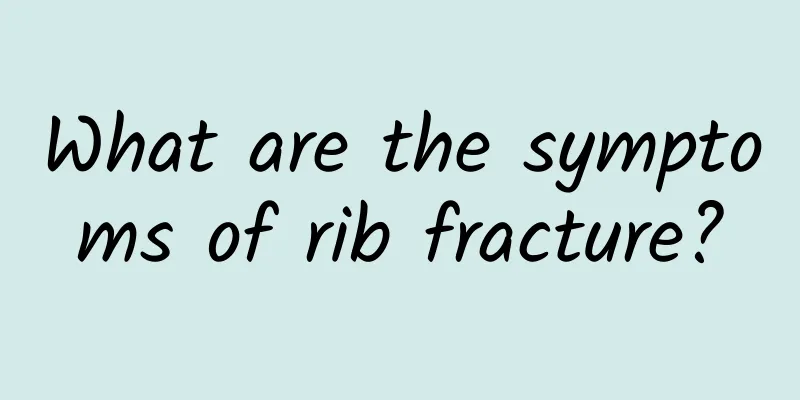What are the symptoms of rib fracture?

|
In the case of rib fractures, the patient himself will actually feel it strongly, that is, there will be severe pain in the chest area. If the limbs move vigorously or take deep breaths, the chest pain will be aggravated. Rib fractures need to be treated in a timely manner to avoid affecting the patient's normal life, and attention should be paid to care during the treatment process. 1. Symptoms Occasionally, due to severe coughing or sneezing, the chest muscles suddenly contract and cause rib fractures, which are called spontaneous rib fractures. They mostly occur in the 6th to 9th ribs in the axillary area. When the ribs themselves have lesions, such as primary tumors or metastatic tumors, rib fractures may also occur with very light external force or no external force. This is called pathological rib fractures. Rib fractures mostly occur at the 4th to 7th ribs; the 1st to 3rd ribs are protected by the clavicle, scapula and shoulder girdle muscles and are not easily fractured; the 8th to 10th ribs gradually become shorter and are connected to the cartilage costal arch, which has elastic cushioning and reduces the chance of fracture; the 11th and 12th ribs are floating ribs with a greater range of motion and rarely fracture, but when the force is strong, these ribs may fracture. A fracture of only one rib is called a single rib fracture, and fractures of two or more ribs are called multiple rib fractures. Rib fractures can occur on both sides of the chest at the same time. A fracture in only one place on each rib is called a single fracture, and a fracture in two or more places is called a double or multiple fracture. Sequential fractures of multiple ribs or multiple rib fractures combined with epiphyseal detachment of multiple costal cartilages or fractures of multiple costal cartilages on both sides or epiphyseal detachment will cause chest wall softening, which is called a floating chest wall injury, also known as flail chest. Local pain is the most obvious symptom of rib fracture, and it worsens with movements such as coughing, deep breathing or body turning. Sometimes the patient can also hear or feel a "clicking" sensation of bone friction at the fractured rib. Pain and destruction of chest stability can limit respiratory mobility, cause shallow and rapid breathing and reduce alveolar ventilation. Rib fractures without associated injuries are called simple rib fractures. In addition to pleural and lung injuries and the hemothorax or (and) pneumothorax caused by them, they are often accompanied by other chest injuries or injuries outside the chest. Special attention should be paid during diagnosis. Fractures of the first or second rib are often accompanied by clavicle or scapula fractures, and may be accompanied by injuries to intrathoracic organs and large blood vessels, bronchial or tracheal ruptures, or cardiac contusions, and are often accompanied by craniocerebral injuries; lower chest rib fractures may be accompanied by abdominal organ injuries, especially ruptures of the liver, spleen and kidneys. Attention should also be paid to combined spinal and pelvic fractures. However, when the ribs below the seventh rib are fractured, the intercostal nerves at the fracture site are stimulated, resulting in conductive abdominal pain, which should be distinguished from the localized abdominal pain caused by abdominal organ injury. 2. Auxiliary examination Most rib fractures can be shown on chest X-rays. However, costal cartilage fractures, "willow branch fractures", fractures without dislocation, or mid-rib fractures are difficult to detect on chest X-rays because of the overlapping of ribs on both sides. Therefore, the diagnosis should be made based on clinical manifestations to avoid misdiagnosis. If there is a history of chest trauma, local pain and tenderness in the chest wall, and a positive chest compression test, the possibility of thoracic fracture should be considered, which can be confirmed by X-ray examination. If a friction sound can be felt at the tender point, the diagnosis can be established. If abnormal respiratory movement occurs in the chest wall, it means that multiple ribs are fractured. |
<<: What causes pain under the ribs when coughing?
>>: What is the cause of rib bone hyperplasia?
Recommend
Which acupoints should be moxibustioned when there is heavy dampness?
Many people are very confused. Where does the moi...
What are the benefits of taking vitamin B for girls?
Vitamin B has many benefits to the human body and...
What are the traditional Chinese medicines that cool the blood? Don’t miss these detoxifying remedies!
Traditional Chinese medicines for cooling blood g...
Can Chinese medicine promote ovulation?
Many women have poor ovulation or no ovulation. T...
Polyp on waist
Polyps are a very special disease that can occur ...
Is it good to use salt water to relieve cough during pregnancy?
If a pregnant woman has a cough during pregnancy,...
How does sacroiliitis affect patients?
Sacroiliitis is a disease that has a significant ...
Symptoms of stillbirth at two months of pregnancy
Basically every woman will get pregnant if she ha...
The best treatment for premature beats
Premature heart beats are a relatively common sym...
Sudden itchy skin
Many people think that it is caused by allergies ...
What are the Chinese medicines that reduce fever the fastest?
For children, fever in daily life is still very c...
Traditional Chinese Medicine Self-Test for Obstruction of Fallopian Tubes
For Chinese medicine, many diseases can be treate...
Precautions for floating needle treatment of lumbar disc herniation
When it comes to floating needle therapy, many pe...
Medicinal effects and functions of fruit leaves
Fruit leaves are the name of a Chinese medicine. ...
How long does it usually take to boil Chinese medicine?
Traditional Chinese medicine is the quintessence ...









